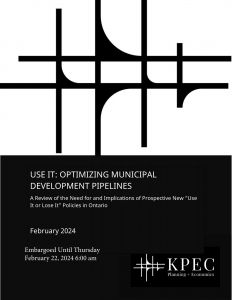Ottawa Home Builders are moving homes as fast as possible, says new study
February 23, 2024
OTTAWA – A new report commissioned by the Ontario Home Builders’ Association shows Ottawa’s home builders are effective in getting housing through the development pipeline and handing over the keys to Ottawa’s growing population.
The report titled Use It: Optimizing Municipal Development Pipelines, released on behalf of the residential construction industry province-wide, is a review of the Ontario government’s prospective use-it-or-lose-it (UIOLI) policy for residential development.
“The need for new or enhanced UIOLI policies presumes that approved homes aren’t getting built or that land is being held back,” said Jason Burggraaf, Executive Director of the Greater Ottawa Home Builders’ Association (GOHBA). “However, provincial and local data shows otherwise — in 2023, the amount of housing units completed and inventory of units currently under construction across the province reached highs not seen since 1990.”
Specific to Ottawa, the report provides a breakdown of the city’s Vacant Urban Residential Land Survey, which catalogues greenfield inventory for housing, revealing:
- Approximately 68 per cent of units registered in the mid-2018 report were no longer in the city’s 2022 inventory, with those units being constructed.
- Of the units that were registered and not yet built, it is likely that further approvals such as site plan and zoning are still pending.
- 82 per cent of units not yet built were apartment developments. As Ottawa sees more multi-family buildings, this suggests that an enhanced UIOLI policy may disproportionately affect the approvals, permissions or servicing allocation for high-density developments.
- Among ground-related housing types, 93 per cent of singles/semis were no longer in the city’s future inventory, as well as 92 per cent of stacked units.
- The total inventory of housing unit potential over the last four years (2018-2022) fell by 13,000 units, from 77,404 units to 64,786 units.
- Over the past eight years (2014-2022), the total number of housing unit potential in the pipeline fell by over 24,000 units.
The numbers suggest that a significant proportion of designated land for housing is moving through the planning process at a reasonable pace.
“It’s not in the industry’s interest to sit on land that’s ready for housing,” Burggraaf said. “In fact, we need to do everything we can to avoid delays in the approvals process, which increase costs and impacts housing affordability for Ottawa’s residents.”
Last year Ottawa signed a Municipal Housing Pledge with the province, committing to 151,000 new homes to be built over the next decade. Enhanced UIOLI measures could negatively affect the City’s ability to meet its pledge.
The report highlights the existing checks and balances in Ontario’s planning system, including:
- Expiration of building permits
- Timelines to deem registered plans inactive/unregistered
- Lapsing draft plan approvals
- Revoking of servicing allocation
The imposition of an enhanced system of UIOLI may, in many municipalities, bring lands below minimum Provincial Policy Statement (PPS) requirements for designated and available residential supply and land with serviced capacity.
If the province decides to enhance existing methods for managing housing supply, as a first step, it should ensure that eliminating approved supply doesn't breach PPS minimum requirements. Any lost servicing allocation should be redistributed to other potential residential supply, and this redistribution process must be transparent and objective.
Media are invited to view the full report here.
For Ottawa media inquiries, please contact:
Jason Burggraaf
Executive Director
Greater Ottawa Home Builders' Association
613-983-3060
jason@gohba.ca
ABOUT THE GREATER OTTAWA HOME BUILDERS’ ASSOCIATION:
The Greater Ottawa Home Builders’ Association has been the proud voice for excellence in the home-building community since 1951, and represents over 415 companies in new home construction and professional renovation. Our industry accounts for 37,000 jobs across Ottawa, with $2.5 billion in wages and $5.0 billion in economic investment.

